Is Frictional Games working on a new IP? I'm a bit curious as to why they outsourced development of the aptly-named A Machine for Pigs to the third-party developer The Chinese Room. Frictional's staff did stay on as "producers" for this game, so I'm sure that the final product is still consistent with what Frictional would have wanted if they had developed it themselves, and I think the overall story was still written by people at Frictional (but I could be wrong on that account). In any case, the change in development team has certainly had a dramatic effect on the way that the new game plays. The very core gameplay of exploring a linear dungeon with a flashlight is retained, but all the mechanics and the underlying feel of the game are completely different than its predecessor. This isn't necessarily a bad thing, as Amnesia: the Dark Descent wasn't perfect.
A familiar premise, unfamiliar feel
Once again, the underlying premise that sets up Amnesia: a Machine for Pigs is that your character wakes up in a mansion with no memory of who he is or why he is there. Your early exploration of the mansion reveals some vague threat, and you are forced to descend into a deep dungeon in order to discover who you are and resolve the threat. Along the way, you'll encounter deformed creatures and collect notes and documents from your former self explaining the situation, as well as have the occasional hallucinatory flashback as your memory slowly returns. But if you're worried that this sounds too much like the previous game, then fear not: A Machine for Pigs takes an entirely different approach to the gameplay and has a totally different feel to the entire experience.
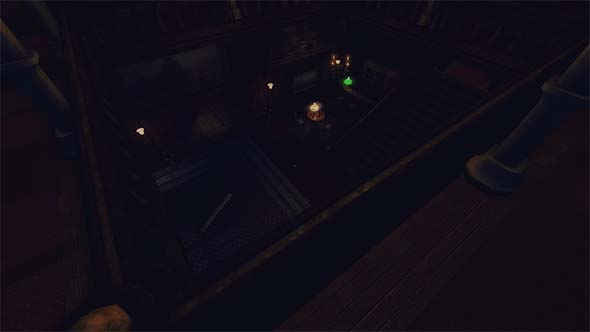
The setting has advanced a century or two to Industrialized England.
A machine of sound and fury, signifying nothing
The most immediately obvious major change is that the macabre Gothic castle has been replaced with a industrial complex in Victorian England. The fantasy-RPG-like dungeons and Inquisition-inspired torture chambers have been replaced with steam-powered machines and slaughter-house animal cages. The new aesthetic has a feeling much more akin to the first Silent Hill than to the original Amnesia, and the mansion that you wake up in reminded me a lot of the mansion from the first Resident Evil. Instead of descending into a deep, dark dungeon, you'll be descending into a deep, dark, industrial machine. The result is that the quiet, subtly-ominous ambiance of the first game is replaced with a much louder audio experience. In the previous game, the sound effects consisted mostly of wind, crumbling stone, the flicker of candles, and your own footsteps and labored breathing. This amplified every little sound that you heard and allowed your imagination to wander. Now, you are constantly accompanied by the whirring and clanking of loud machines and the hissing of steam.
So everything has to be louder in order to break through all the background noise. Monsters make loud, annoying squels to announce their presence, attention-getting noises have to be loud, metallic crashes and explosions, and restarting machines is accompanied by that loud noise that you hear in movies when the lights are turned on in a warehouse. Do large-scale industrial lights really make that noise? Or is that another thing that was made up by Hollywood, like the metallic sliding sound that Hollywood pretends that swords make when you draw them out of the leather or wooden scabbards that they are usually sheathed in?
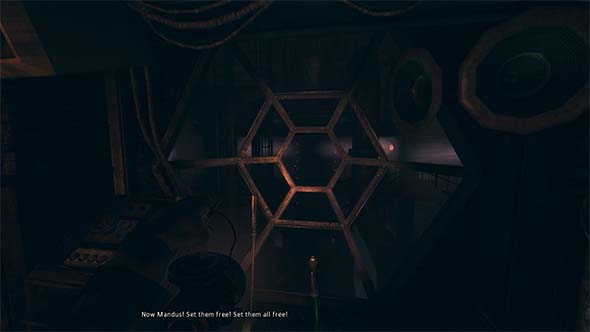
Is this a Death Star?
The movement of the active machine does do a good job of playing tricks with the light. Spinning fans and rotating pistons will cast shadows and create movement in the steam and smoke at the edge of your vision. But this effect doesn't really stay scary because you'll learn very early on that the presence of creatures causes the flashlight to flicker. So the visual effects don't retain their fear-inducing effects for very long. Silent Hill: Shattered Memories had the same problem: the flashlight flickered, and your radio made a static noise whenever you hovered the cursor over the location of a monster, even through walls. So you always know when a creature is behind a wall or around a corner, so you never have to proceed with caution, nor are you ever surprised when a creature is waiting for you (unless the game breaks its own rules!).
Papers, please!
There's no inventory anymore, so item collection and a majority of the puzzles have also been removed. The handful of puzzles that remain are very simple and usually just require the player to push buttons or pick something up (like a gear or capacitor) and carry it to another room so you can plug it into the machine that it was pulled out of. Yawn.
At least the puzzles are never as obtuse as a couple of Dark Descent's puzzles are.
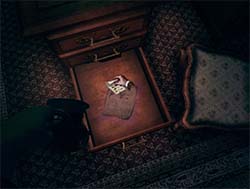
Document-collecting seems to be the primary game mechanic...
Without an inventory, there also aren't any consumable items anymore. You have an electric flashlight instead of an oil lantern, so you don't need to pick up oil, and all the light fixtures in the game are electric lights, so there aren't any tinderboxes either. Sanity and health are also pretty much gone, so there's no laudunum for you to find hidden in desks. Pretty much the only reason left for exploration is to pick up the obscene number of documents that are scattered about. It seemed like every two minutes, I was picking up a note or reading a memo.
The new character memos everything that he does, and instead of just being there to remind you what you're supposed to be doing (à la a list of objectives), these memos also contain bits of story information that is actually important to read. So why don't they just flash the text on the screen like when you pick up a note? Or why not just have the character mumble the memo text out loud and then just record it in a menu in case you need to recall it later? It's annoying enough that stopping to read a page of text is the only reward for exploring, but now it's also necessary to stop the game every few steps to read text describing what you just saw or what you were just told to do - or else miss a possibly-essential piece of narrative exposition?!
This little piggy went to hell
You're exploration objectives are primarily given to you via a mysterious voice that calls you up on the telephones scattered throughout the factory complex. This voice explains that the factory machinery has been sabotaged, that the machine is being flooded, and that your children are trapped inside. In order to save them, you must navigate through the machine's inner workings, repair the damage, and reactivate the machinery. This provides the character with the primary motivation for the quest. But the machine is infested with strange, pig-like half-breed creatures - the result of some twisted experiment. Besides the haunting mystery of the nature of the machine that you are slowing bringing back to life, the pig creatures act as your primary antagonists. Despite their lethality, these pigmen aren't nearly as frightening or threatening as the creatures from Dark Descent.
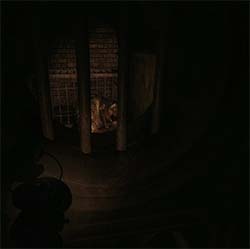
The pigmen just don't feel as menacing as the mysterious creatures from Dark Descent.
This is partly because the game doesn't try to conceal them or encourage the player to run away and hide from them. Very early on, you're given plenty of opportunity to examine the pig creatures up close and personal. It's easy to see exactly what they are, and make educated guesses about where they come from. So there isn't much room left for the imagination to make them seem more threatening than they actually are. The fact that your flashlight acts as a "pigman detector" takes any chance of surprise away. You always know when one is coming up, and even then, they aren't always dangerous. Sometimes, they're locked in a cage or otherwise out of your reach. When they are threatening, they just pace back and forth along a small path, and all you have to do is sneak past them when their back is turned. You may need to turn off your flashlight, since the light gets their attention, but that is about the only precaution that you need to take against them.
Encounters with hostile pigmen are also few and far between (even more rare than monster encounters in Dark Descent). This keeps the game moving without needing to pressure the player to proceed in order to preserve their sanity (which doesn't exist in this game), and it avoids making things tedious by repeatedly killing the player and respawning him at checkpoints. But since actively avoiding the pigmen doesn't even make up a significant portion of the game, and puzzles have been minimized to the point of being mundane, the only primary game mechanic is just walking from place to place, looking at the massive machine, pulling levers, and picking up notes. Not exactly the most exciting game ever...
A more personal and introspective journey makes up for lacking gameplay
The narrative of A Machine For Pigs definitely doesn't skimp on the morbidity. Dark Descent had a pretty gruesome plot that revolved around torture and how desperation can cause a person to commit atrocious acts. Mandus' tale in A Machine For Pigs is similar, but also a bit more morbid and unsettling, and this is where the game really shines!
The story itself is very similar to the previous game, but the focus of the narrative goes off in a subtly different direction, giving this game a much more sadistic and unsettling tone. There's a much grayer line between good and evil this time around, and the game really challenges the player to question whether the road to hell might really be paved with good intentions. This game also focuses heavily on themes of dehumanization through references to industrialization, and by comparing people to pigs in a slaughterhouse (which is where the game's name is derived).
[Show Spoilers] [Hide Spoilers]
Much like Daniel in Dark Descent, Mandus is seeking to atone for past sins. The previous game's story focused on how Daniel became aware of the monster that he had become, and the entire game is about him trying to atone. But unlike the former game, A Machine For Pigs focuses on Mandus' rapid descent into psychopathy. The creation of the monster is the focus of this story, not the recognition and guilt.
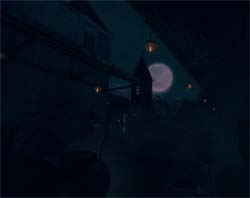
You'll spend some time outside, wandering the lifeless streets of London.
Mandus' contact with [what we are to assume is] an Orb in a Mayan temple gives him a vision of the future in which he sees the horrors of the first two World Wars and the invention of the atomic bomb, as well as the deaths of both of his sons in the Battle of the Somme. These visions, combined with the death of his wife, drive him mad with the desire to "save" mankind from the horrors of the century to follow by reshaping the world (and mankind itself) through the marvels of industrialization and Frankenstein-esque biology experiments. Unfortunately, the horrors of the vision cause him to begin associating human beings with the pigs that are slaughtered in his meat-packing factory. He begins to see all humans as just pigs being lead to the slaughter by the machine of the world: thus, the entire world is but "a machine for pigs". As he develops his grand machine, this dark part of his personality somehow becomes embedded in the machine's being (possibly the result of the influence of the Orb, but the game doesn't specify), and the machine gains a consciousness. The machine seeks to replace all of mankind with horrific pig creatures (since it sees humans as pigs to begin with) and to run the entire world as a gruesome assembly-line, and Mandus' offers his own children as sacrifices in order to save them from brutal death in the first World War.
The majority of the game's notes, flashbacks, and recordings that you encounter outline Mandus' descent into madness, meticulously outlining his pessimistic [to say the least] outlook on the human condition. Much like watching a movie about racism or sexism, the mentality of the character is sickening and makes you feel "unclean", but at the same time, there's a morbid truth to what he says, and the player shares in his desire to save humanity from itself. But not like this. Good intentions or not, Mandus had become a monster.
And even as the player is slowly learning about Mandus' warped mentality, and the true intent and extent of the machine, you are happily repairing sabotage and turning the machine back on, and it's not until late in the game that the character realizes that he's been played for a fool. Of course, this twist is fairly easy to see coming, but I have to say that the identity of the voice on the phone did take me a bit by surprise.
End of Spoilers
The "Creeper Room"
There were a few elements of the game's narrative that kind of threw me for a loop.
Very early on, while we are still exploring Mandus' mansion, we make our way into some secret passage ways. These passageways have two-way mirrors that allow people in the passages to see out into the mansion through paintings and other decorations. One place where this is particularly noticeable is in one of the bathrooms. The secret room here has a window that looks out onto the sink and into the bath tub. The secret room's walls are covered in drawings and [possibly] photographs of a woman bathing in the tub, and the floor is littered with empty bottles and other trash, implying that the room was very heavily used.
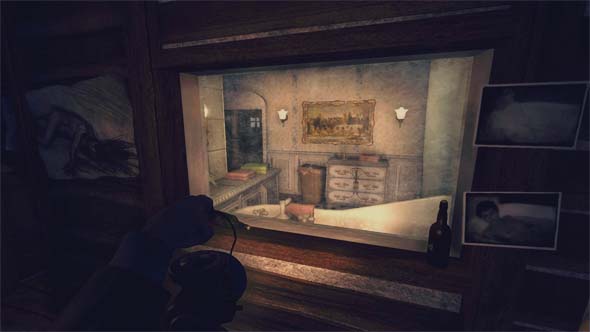
Somebody was clearly a total creeper.
Strangely, the game doesn't really go anywhere with this particular plot thread, so I'm not sure what the writers were trying to convey...
Apparently, Mandus liked to watch his wife bath from this secret room. I didn't really get the point of this room. Is it supposed to make us dislike Mandus because he's a peeping Tom? Or is it just an excuse to show crudely-drawn boobs in order to offset the penises that appear so frequently in both Amnesia games?
Sometimes a cigar is just a cigar. I don't expect every game to have the deep symbolism and meaning of Silent Hill 2. But if the designers actually want us to like the protagonist and sympathize with his quest, then they probably shouldn't go out of their way to suggest that he's a total creeper-perv...
Worth it for the story, but Dark Descent was better
Overall, A Machine for Pigs feels like a bit of a let down. The gameplay is simplified almost to the point of being boring, and it relies way too heavily on note-finding in order to present the narrative. The lack of any significant puzzles, and the ease with which the pigmen can be avoided, makes the game go by very quickly and feel very unchallenging. But the narrative itself, and the unique atmosphere of the machine provide an interesting supplement to The Dark Descent. I definitely recommend playing The Dark Descent first though.